#when I was watching secret seven I was like that's a butch lesbian right???
Explore tagged Tumblr posts
Text
I just found out that the director for Love Senior:
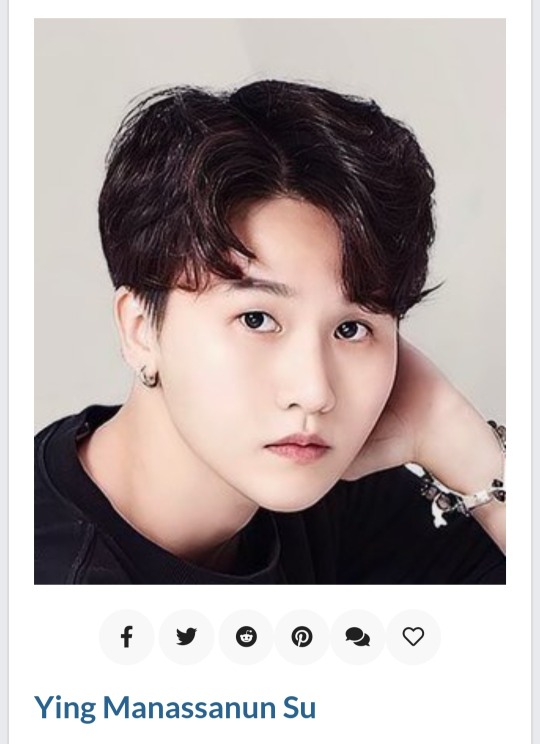
Was also assistant director for the GMMTV series Secret Seven where she made a cameo in the last 2 episodes as the main lead's mom's girlfriend:
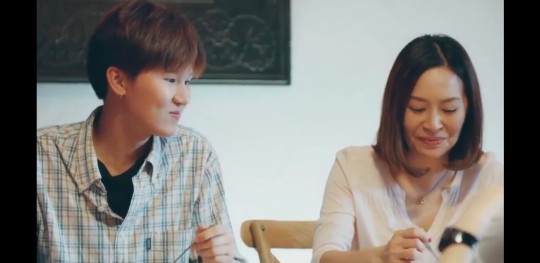
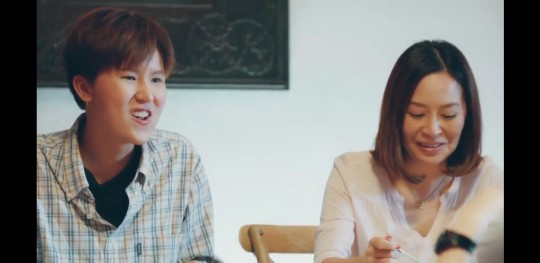
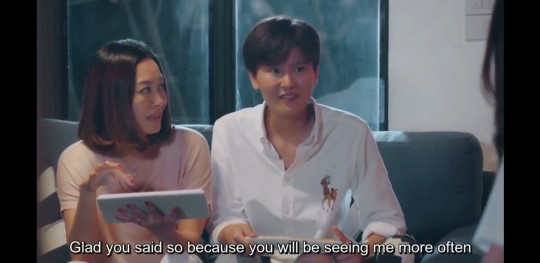
She really was destined to direct a GL lmao
#side note P'Ying is fine as hell lmao#when I was watching secret seven I was like that's a butch lesbian right???#and low and behold lol#in the show she's a taxi bike driver called mr.11 who wheres a helmet for most of the series#which is why I wasn't sure#love senior#secret seven#gmmtv#love senior the series#she speaks
3 notes
·
View notes
Text
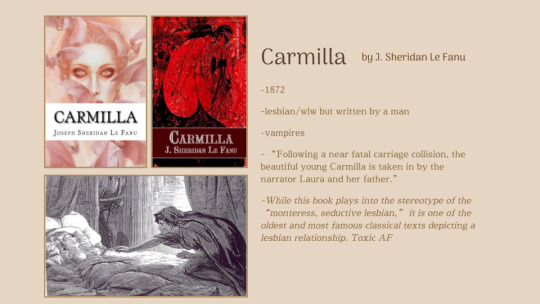

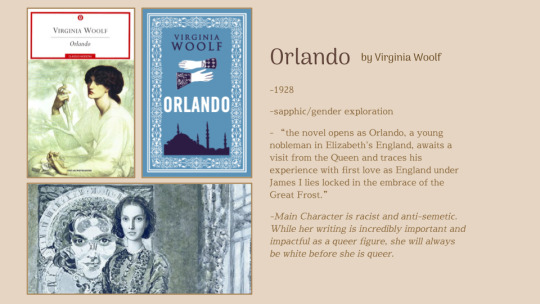
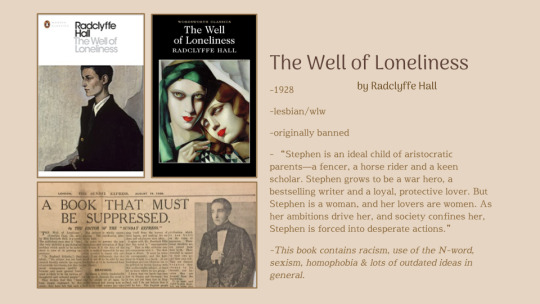
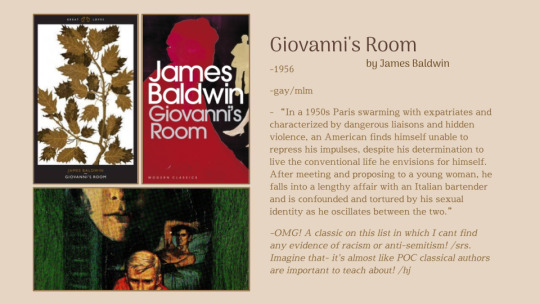
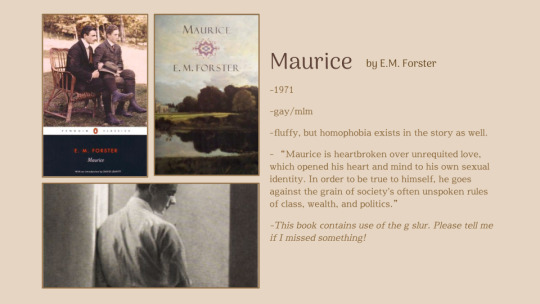

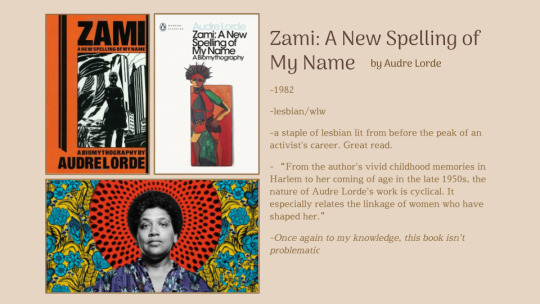
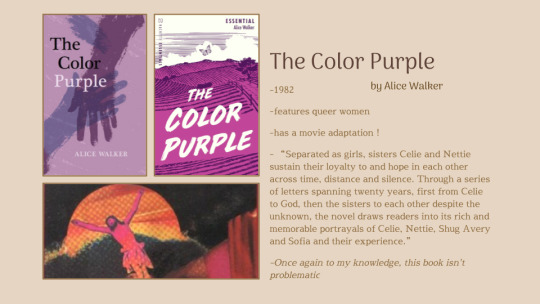

queer classic book recs!!
Image description under the cut! Please tell me if I did something wrong and I will gladly change it!
The other recs will be in the reblog!
[Each slide excluding the title screen includes 3 photos relating to the book, largely alternative covers of each in a small grid format.]
Slide One: In the center is a box with interior text reading "13 lgbtq classics and 1 “modern” classic. Recs in the comments welcome!" The top left corner includes an image of a calligraphy quill. Underneath this is text that reads "Disclaimer! The beginning of this list is.. Very White, but don't worry it gets more diverse as the books get more recent!!" In the top right corner is a text box reading "Look up trigger warnings or I’ll steal your gender! … or give it back!!" under this is a picture of an open book displayed in the foreground and another stack of books in the background.
Slide Two: Carmilla by J. Sheridan Le Fanu.
1872
Lesbian/wlw but written by a man
vampires!
“Following a near-fatal carriage collision, the beautiful young Carmilla is taken in by the narrator Laura and her father.”
While this book plays into the stereotype of the “monteress, seductive lesbian,” it is one of the oldest and most famous classical texts depicting a lesbian relationship. Toxic AF.
Slide Three: The Picture of Dorian Gray by Oscar Wilde
1890
not explicitly queer (subtext)
but gay (mlm) tho
“Enthralled by his own exquisite portrait, Dorian Gray exchanges his soul for eternal youth and beauty. Influenced by his friend Lord Henry Wotton, he is drawn into a corrupt double life, indulging his desires in secret while remaining a gentleman in the eyes of polite society. Only his portrait bears the traces of his decadence.”
This book contains Anti-semitism, Racism, Sexism and is honestly a product of its time. Oscar Wilde is certainly a character.
Slide Four: Orlando by Virginia Woolf
1928
sapphic/gender exploration
“The novel opens as Orlando, a young nobleman in Elizabeth's England, awaits a visit from the Queen and traces his experience with first love as England under James I lies locked in the embrace of the Great Frost.”
Main Character is racist and anti-Semitic. While her writing is incredibly important and impactful as a queer figure, she will always be white before she is queer.
Slide Five: The Well of Loneliness by Radclyffe Hall
1928
lesbian/wlw
originally banned
“Stephen is an ideal child of aristocratic parents—a fencer, a horse rider, and a keen scholar. Stephen grows to be a war hero, a bestselling writer, and a loyal, protective lover. But Stephen is a woman, and her lovers are women. As her ambitions drive her, and society confines her, Stephen is forced into desperate actions.”
This book contains racism, use of the N-word, sexism, homophobia & lots of outdated ideas in general.
Slide Six: Giovanni's Room by James Baldwin
1956
gay/mlm
“In a 1950s Paris swarming with expatriates and characterized by dangerous liaisons and hidden violence, an American finds himself unable to repress his impulses, despite his determination to live the conventional life he envisions for himself. After meeting and proposing to a young woman, he falls into a lengthy affair with an Italian bartender and is confounded and tortured by his sexual identity as he oscillates between the two.”
OMG! A classic on this list in which I can't find any evidence of racism or antisemitism! /srs. Imagine that- it's almost like POC classical authors are important to teach about! /hj
Slide Seven: Maurice by E.M. Forster
1971
gay/mlm
fluffy, but homophobia exists in the story as well.
“Maurice is heartbroken over unrequited love, which opened his heart and mind to his own sexual identity. In order to be true to himself, he goes against the grain of society’s often unspoken rules of class, wealth, and politics.”
This book contains the use of the g slur. Please tell me if I missed something!
Slide Eight: HERmione by H.D.
1981
queer/sapphic woman author
poetry
so mf sad bro I mean look at that blurb
“An interior self-portrait of the poet H.D. (1886-1961) is what can best be described as a 'find', a posthumous treasure. ‘I am Hermione Gart, a failure' -she cried in her dementia, 'I am Her, Her, Her.”
To my knowledge, this book isn't problematic- please tell me if it is though!!
Slide Nine: Zami: A New Spelling of My Name by Audre Lorde
1982
lesbian/wlw
A staple of lesbian lit from before the peak of an activist’s career. Great read.
“From the author's vivid childhood memories in Harlem to her coming of age in the late 1950s, the nature of Audre Lorde's work is cyclical. It especially relates the linkage of women who have shaped her.”
Once again to my knowledge, this book isn't problematic
Slide Ten: The Color Purple by Alice Walker
1982
features queer women
has a movie adaptation!
“Separated as girls, sisters Celie and Nettie sustain their loyalty to and hope in each other across time, distance, and silence. Through a series of letters spanning twenty years, first from Celie to God, then the sisters to each other despite the unknown, the novel draws readers into its rich and memorable portrayals of Celie, Nettie, Shug Avery, and Sofia and their experience.”
Once again to my knowledge, this book isn't problematic
Slide Eleven: Oranges Are Not the Only Fruit by Jeanette Winterson
1985
lesbian/wlw
“This is the story of Jeanette, adopted and brought up by her mother as one of God's elect. Zealous and passionate, she seems destined for life as a missionary, but then she falls for one of her converts. At sixteen, Jeanette decides to leave the church, her home, and her family, for the young woman she loves. Innovative, punchy, and tender.”
Once again to my knowledge, this book isn't problematic- but warning, there are quite heavy themes!
Slide Twelve: Dykes to Watch Out For by Alison Bechdel
1986
lesbian/wlw
a classic comedy comic + a really good insight & look into lesbian culture
“Grin, giggle, and guffaw your way through this celebrated cartoonist's graphic commentary of contemporary lesbian life.”
Once again to my knowledge, this book isn't problematic*
*contains d-slur used by lesbians in a non-offensive way
Slide Thirteen: Stone Butch Blues by Leslie Feinberg
1993
lesbian/gender identity around lesbianism
“Woman or man? This internationally acclaimed novel looks at the world through the eyes of Jess Goldberg, a masculine girl growing up in the "Ozzie and Harriet" McCarthy era and coming out as a young butch lesbian in the pre-Stonewall gay drag bars of a blue-collar town. Stone Butch Blues traces a propulsive journey, powerfully evoking history and politics while portraying an extraordinary protagonist full of longing, vulnerability, and working-class grit.”
Once again to my knowledge, this book isn't problematic
Slide Fourteen: Tipping the Velvet by Sarah Waters
1998
lesbian/wlw
historical romance
“Nan King, an oyster girl, is captivated by the music hall phenomenon Kitty Butler, a male impersonator extraordinaire treading the boards in Canterbury. Through a friend at the box office, Nan manages to visit all her shows and finally meet her heroine. Soon after, she becomes Kitty's dresser, and the two head for the bright lights of Leicester Square where they begin a glittering career as music-hall stars in an all-singing and dancing double act. At the same time, behind closed doors, they admit their attraction to each other and their affair begins.”
Once again to my knowledge, this book isn't problematic
Slide Fifteen: Under the Udala Trees By Chinelo Okparanta
2015
lesbian/wlw
modern classic imo, look into the coexistence of native Nigerian culture & queerness
“Ijeoma comes of age as her nation does; born before independence, she is eleven when civil war breaks out in the young republic of Nigeria. Sent away to safety, she meets another displaced child, and they, star-crossed, fall in love. They are from different ethnic communities. They are also both girls. When their love is discovered, Ijeoma learns that she will have to hide this part of herself. But there is a cost to living inside a lie.”
Once again to my knowledge, this book isn't problematic
#queer books#lgbtq books#classic books#classic literature#lgbt books#book recommendation#classics#books#literature#poetry#lgbtq#queer#diverse books#diverse reads
49 notes
·
View notes
Text
An Essay on My Sexuality
For 17 years of my life I thought I was straight. I was raised by straight people and surrounded by straight people my entire upbringing. The first time I met an out lesbian, I was 15. She was a classmate, a friend my age, and it was then that I realized two things: I realized that not every girl that liked girls were butch, and I realized that kids my age were starting to realize these things. I never questioned whether or not I was straight because I knew that I liked boys, and I had grown up thinking gay girls were all dykes who played with monster trucks when they were little and grew up to wear flannels and cut their hair short. I don’t think I even realized Ellen DeGeneres was gay even though she came out three years before I was even born and I watched her show all the time. So to find out this girl that I’d become friends with and sat next to in French class had a girlfriend was almost like culture shock to me and my heteronormative life.
I knew boys were gay. My parents were friends with a gay couple, David and Jason, who’s cottage we went up to one summer and who gifted me a teddy bear and took me boating. They were flamboyant and wore scarves and one of them was an interior decorator. When boys in my class growing up were labeled “weird” or weren’t into sports, they were called gay. To me, that’s what a gay man was. Flamboyant, feminine, not into sports. In grade four, it was a common thing for the popular boys in my class to fake hump each other or pretend to want each other sexually, just to get a laugh out of the class. And it worked, too. We all thought it was hilarious. If you were gay, you were either weird or you were kidding.
Girls liking girls wasn’t ever really talked about. It was normal for girl friends to be affectionate and hug or say that they loved each other. If you dressed masculinely, played sports or hung out with guys, you were just a tomboy. Liking girls romantically was just never talked about. The first time I’d heard any of my classmates say the word lesbian or talked about liking girls, I was in grade seven and it was an accusation, an insult. The girls I considered my friends were playing a fun game where every time I went up to them, they’d run away or ignore me. I didn’t find this very fun, and I’d chase them or try to talk to them repeatedly. Eventually, one of the girls said, “Why are you so obsessed with us? What are you, a lesbian?” The other girls thought this was hilarious, and they moved on from ditching me to saying I was a lesbian. “It’s alright, guys, Lucinda’s just a lesbian.” “Come on, Lucinda, don’t deny it. We all know you’re a lesbian.” “Don’t go getting a crush on me, okay Lucinda? I’m not a lesbian like you.”
I was near tears trying to deny it. I was so angry. I wasn’t a lesbian, I just wanted them to stop ditching me. I’d always felt out of place among my friends. The town I grew up in was very rich and very white and very mean. All the girls I considered friends were blonde and mean, constantly back stabbing and making fun of others and creating new allegiances trying to block others out. I was at least a head taller than all of them, I was lanky, I was just starting to grow boobs, and I stood out like a sore thumb. I was also the only nice one of the girls I was friends with, the only forgiving one, and they used this to their liking. They would hurt me and immediately I would forgive them because to me at the time, that was better than not having any friends. This new accusation of being a lesbian was just another case of them picking on me in a way that was supposed to be in good fun.
In grade 8, I moved to a new province and started going to an all girls private Catholic school. Sometimes it was mentioned as a joke that girls who went to an all girls school would always end up lesbians, but none of the girls I went to school with actually were, at least to my knowledge. It was the opposite, really. They would take any chance they could get to interact with the all boys school we were affiliated with. Because it was a Christian school, being gay was a topic completely avoided so as to not stir up any controversy.
Then two years later I went to high school and moved back into public schooling, and I met my first real life lesbian. So the rumours were true. They did exist.
I never cared that this new friend of mine was gay. If anything it was a relief, because she was close with a boy I thought was cute and this meant she wasn’t competition. Sometimes she’d make jokes about being gay, and I would be surprised at how easily she’d talk about it. Then one of my sisters longest friends and someone I’d always been close with too, got a girlfriend, and I almost felt like I didn’t really ever know her. Then my best friend of 12 years came out to me, and by that point I was no longer surprised. A few months earlier, this friend had confessed to me that she drunkenly made out with one of her friends who’s a girl, like it was some big secret when I knew drunk girls made out with their drunk girl friends all the time. The fact that she’d told me the way she did, like she was testing the waters, made me see it coming when she came out. Now I knew three lesbians, and none of them were butch, and I quickly became used to the fact that lesbians existed and that some of them were my friends.
At this point I was also growing up. I was 15, nearing 16, and I was becoming more and more aware of the world and the people in it. I was becoming aware of issues in society and the things that were going on around me. I no longer saw everyone as automatically straight. I started caring about homophobia and racism and sexism.
The summer I was 16, I went to a Christian summer camp back in Ontario. I’d been there a few years already as a camper, and my sister had gone for several years and been a counsellor there too. That year, I was to be a Leader In Training. Two weeks of leadership workshops, a four day canoe trip, and then two weeks of being a counsellor. In one of the leadership workshops, we had a discussion about sexuality and the bible. They beat around the bush, telling some bible story that had nothing to do with the topic, before we really realized what they were saying: to them, the bible says that being gay is a sin. Homosexuality was not allowed at camp. Gays are going to hell. If a camper asks, that’s what you’re supposed to tell them, and in order to work at camp we’re supposed to sign a contract agreeing with this. Hearing this, and thinking about it now, created a pit in the bottom of my stomach. This camp was my favourite place on earth, did they really enforce that? Did all the leaders at camp, whom I’d grown to look up to, believe this? A lot of my fellow LITs were upset, and two of them, one a lesbian and the other an ally, went home early. I felt guilty for not joining them, for barely even speaking up. I thought this was just the company that owned my camp, InterVarsity, I thought it wouldn’t actually affect the part of the camp where I’d be spending my time. So I let it slide.
When I was an active counsellor at Girls’ Camp, things were different. I still had an amazing summer, but all the staff were there for their last year, talking in hushed tones to one another and not sharing anything with me. I found out after the summer was over that InterVarsity had been pulling aside staff members and asking them to go over the contract again to double check that they all agreed to this. The majority of them said no, and were fired for it. They fired the camp director, the co-directors, a lot of the leadership team, before they changed their terms. They wouldn’t have to go home right away, but this would be their last summer at camp. I was so upset. I knew that I wouldn’t be able to go back until they changed their policy, which I knew they’d never do. This camp where I thought everyone was so welcome, had been overtaken with homophobia.
When I tried discussing this with my best friend from camp, I found out that she agreed with them. She tried to tell me that being gay was a sin, she started quoting bible verses at me and talking like someone I’d never met before. I was appalled and shocked, and after sending her a long essay about how wrong she was, I never talked to her again.
That was when I first started really caring about LGBTQ+ issues. It wasn’t until it affected me directly did I realize the extent of how it affected anyone in the first place. I knew a bunch of girls from camp who were coming out as gay in light of what had gone down at camp. Before it was announced that America had officially made gay marriage legal, I didn’t even know it wasn’t legal. I had been so blissfully unaware.
From there I grew, and I started caring more and more about the issues around me. I was a strong ally in LGBT issues and I started learning more about racism, and I grew in the feminist that was already inside me. I started appreciating the sisterhood I had with my close knit girl group of friends, and appreciating the women who’d raised me. None of the women in my life were really that vocal about their feminism or femininity, so I started turning to celebrities for role models to base my feminism off of. I was actively seeking strong actresses to look up to, I was letting the amount of women in a movie affect my opinion of it over all, I was becoming less and less interested in the voices of the white men I’d been hearing my entire life and was looking for the voices that had been neglected throughout history.
When I was newly 17, I was comfortable in the fact that I loved women for their strength and their femininity and their sisterhood with one another. I loved how naturally beautiful they all were, I loved girls who were good at makeup and I loved girls who went all natural and I loved the curves of their natural rolls and their breasts and their hair and their smiles. I loved all of these things because I was a feminist and I knew that all women were wonderful and fighting the world just by being who they are. I didn’t think I loved women romantically, though, until I had a dream.
My dream was about that friend I met in my first year of high school, the first lesbian I’d ever met. I woke up feeling the traces of her on my skin that were never even there in the first place, I felt the warmth in my gut that she’d caused. I realized then that I could appreciate women not just with words but with touch, and they could appreciate me back. Shortly after this dream though, I started dating the friend of her’s I thought was cute back in tenth grade.
My relationship with this guy was predominantly physical, and while I was comfortable in my knowledge that I liked that with him, I also became aware that there was more. To put it frankly, I knew I liked dick, but I realized I would be okay without it. But during that summer with him, those thoughts didn’t matter to me just then, so I pushed them aside.
When the summer ended and I stopped seeing that boy, I came into my sexuality pretty quickly. I started realizing that I was actually also attracted to a lot of these female celebrities that I looked up to so much. My appreciation for women was also an attraction. I realized I wanted to kiss the softness I loved about women, I wanted to run my fingers through their long soft hair, I wanted to hear their delicate laughs and know I’d caused them. And not only did I want a physical relationship with a girl, but I wanted to have the close relationship that only came with romance. I wanted to fall in love with a girl, have her be my partner. I wanted to hold her hand in public and I wanted to tell the world how much I loved women. I was almost reluctant in the fact that I was still attracted to men.
I started coming out as “a little bit gay” to my friends, and they’d ask, “So you’re bisexual?” Yeah. I supposed that was the term you’d use for someone attracted to both guys and girls. I’m bisexual. My two lesbian friends were excited, and all my straight friends couldn’t have cared less. When I told one of my straight friends I liked girls, her response was, “Fair enough.” It was invigorating. I started slipping in gay jokes here and there, I started expressing when I thought an actress was pretty, and started sweating less and less each time I did it. I started reading gay poetry and gay written novels with gay stories within them. I started reading books written by gay writers about their experiences as gay people, I started watching more movies about being gay or directed by gay people. But I still hadn’t told my parents.
I was afraid to tell my parents because they were family. I could get new friends if they didn’t like who I was, but I could never get a new family. It became this big secret I had, when I grew up telling my parents everything. The more politically aware I’d become, the less I idolized my parents. I started seeing the flaws in the way they’d raised me and in the things they’d say, and I’d started calling them out for it. They’d be casually racist or homophobic or sexist, and they wouldn’t understand why I cared so much. They’d get mad when I’d tell them they couldn’t say the n-word in songs, or that they couldn’t use the word “tranny”, or that something wasn’t just meant for boys. My parents weren’t a fan of the language used in the hip hop music I liked to play, and they’d tell me to stop playing that “n- music”. They kept asking if my friend was actually gay or just confused, or they’d tell me about a “tranny” they’d seen on the street. When they found out I smoked weed, they were confused because they thought that was a guy thing. So naturally, I was afraid to tell them I was bisexual. With good reason too, it seemed.
When I did tell them, it was after yet another discussion about my friend’s sexuality even though she’d been out for two years now. They never discussed the sexuality of someone straight. I didn’t comment on that though, instead I said, “I’m pretty gay too, you know” and I waited for their reaction. There was a pause, and then a stare. I clarified and told them again that I’m bisexual and my mom asked things like, “How long have you thought that?” and the use of the word thought wasn’t lost on me. For proof, because for some reason I needed it, I told them about the girl I had a crush on. My mom said you can appreciate someone as a friend without it being gay, like this was news to me. She implied that boobs are fine, but did I really like vagina? And then she spent the rest of the night in an angry silence. My dad, trying to prove that he was okay with it, started making jokes by asking if I could still share clothes with my sister or if I had to dress butch now, or asking if I could still have sleepovers with my friends. For Christmas that year, even though by this point they’d gotten a little more used to it, I got a toolbox to keep my paints in. They said it went with my “whole new gay thing”.
I argued with them for a week or two, and it was awful. I was hurting so much, and I could see how differently they looked at me. For a while I wished that I’d never told them. Even now, though it’s been months, they still avoid talking about it. My mom always expresses how she wants me to bring a nice boy home, or asks if there are any cute boys I like, but she never mentions any girls. She also told me I should make sure one of my close friends knows I’m not trying to hit on her when I ask her to see a movie. She told me to “not scare her off” with my gayness. She says I shouldn’t call myself gay publicly so boys know I’d still be interested. After I made a gay joke to my sister, she told me she was annoyed with all my gayness and to tone it down. When a girl asked me out on a date, my mom and sister both expressed disgust with how butch she was. My dad forcibly never mentions it. My brother couldn’t care less.
Realizing I’m bisexual was hard to come into because I was confident that I liked boys, and it never occurred to me that I could like both. For a long time I was afraid of the word bisexual because of the connotations that the word brings. It made me feel dirty and promiscuous and like I was labelling myself as confused when I’m not. Since coming out, things have never been clearer for me. I’ve found my voice and with each day I know more and more how to use it. I’m finally entirely myself, the last piece of the puzzle has come into place. It’s like a fog has lifted, like I’m finally home.
A Litany For Survival by Audre Lorde
For those of us who live at the shoreline standing upon the constant edges of decision crucial and alone for those of us who cannot indulge the passing dreams of choice who love in doorways coming and going in the hours between dawns looking inward and outward at once before and after seeking a now that can breed futures like bread in our children’s mouths so their dreams will not reflect the death of ours
For those of us who were imprinted with fear like a faint line in the center of our foreheads learning to be afraid with our mother’s milk for by this weapon this illusion of some safety to be found the heavy-footed hoped to silence us For all of us this instant and this triumph We were never meant to survive.
And when the sun rises we are afraid it might not remain when the sun sets we are afraid it might not rise in the morning when our stomachs are full we are afraid of indigestion when our stomachs are empty we are afraid we may never eat again when we are loved we are afraid love with vanish when we are alone we are afraid love will never return and when we speak we are afraid our words will not be heard nor welcomed but when we are silent we are still afraid.
So it is better to speak
remembering
we were never meant to survive.
#the poem at the end helped me come out and is very important to me#anyway there ya go read if you want#lgbt
4 notes
·
View notes